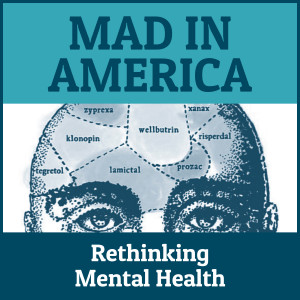
Conflicts of Interest Questioned in Review of Prescribed Drug Dependence
This week on MIA Radio, we discuss the UK Royal College of Psychiatrists representation on a Government-led review of Prescribed Drug Dependence. Professor Sami Timimi, a fellow of the Royal College of Psychiatry, and 30 other mental health experts, have formally asked the College to ‘replace Professor David Baldwin as its representative on The Expert Reference Group of Public Health England’s Review of Prescribed Medicines, with an RCPsych member who is not compromised by conflicts of interest with the pharmaceutical industry’. In this podcast, we hear from Professor Timimi, Psychiatrist Peter Gordon and campaigner Stevie Lewis. Both Peter and Stevie are people who have experienced withdrawal effects from antidepressant drugs. Conflicts of Interest Questioned in Royal College of Psychiatry’s Participation in Government-Led Mental Health Medication Review August 17, 2018 From: James Moore, antidepressant withdrawal sufferer, on behalf of the 30 other signatories to today’s letter. London, UK – A fellow of the Royal College of Psychiatry, and 30 other mental health experts, have today formally asked the College to ‘replace Professor David Baldwin as its representative on The Expert Reference Group of Public Health England’s Review of Prescribed Medicines, with an RCPsych member who is not compromised by conflicts of interest with the pharmaceutical industry’. The Public Health England review1 was set up to examine a growing problem with patients becoming dependent on psychiatric drugs including antidepressants. In the UK, four million people are long-term antidepressant users2, with many of those unable to come off their drugs without debilitating and protracted withdrawal symptoms. Signatories to the complaint include 10 people whose withdrawal experiences have lasted between one and ten years, plus 11 psychiatrists and 8 mental health professors. In the Public Health England (2018) document ‘PMR ERG members declarations of interest’, Professor Baldwin reports having received ‘personal honoraria for lecture engagements organised by AstraZeneca, Bristol-Myers Squibb, Eli Lilly Ltd, Glaxo-SmithKline, Janssen, H. Lundbeck A/S, Pharmacia, Pierre Fabre, Pfizer Ltd, Servier, and Wyeth Ltd’. In addition, he reports attendance at advisory boards of five companies and research funding from twelve. The signatories are worried that he could be unduly influenced by the large number of pharmaceutical manufacturers he has received income from. This concern is exacerbated by Professor Baldwin’s having already publicly minimised the withdrawal effects of antidepressants (Times 24.2.18), which was described as ‘misleading’ the public in the House of Lords3and led to a formal complaint against him4. Lead author of the letter, psychiatrist Professor Sami Timimi, a fellow of the Royal College, said: “DESPITE THE INCREASED AWARENESS OF THE PERNICIOUS INFLUENCE OF THE PHARMACEUTICAL INDUSTRY IN ALL SPHERES OF MENTAL HEALTH, THE RCPSYCH DOES NOT APPEAR TROUBLED BY THE POTENTIAL FOR MISLEADING THE MEDICAL COMMUNITY AND THE PUBLIC AND SOILING THE GOOD NAME OF THE PROFESSION OF PSYCHIATRY. WE FEEL THE NEED TO MAKE PUBLIC OUR OPPOSITION TO SOMEONE SO CONNECTED WITH THE PHARMACEUTICAL INDUSTRY BEING THE RCPSYCH’S REPRESENTATIVE ON A PUBLIC BODY APPOINTED WITH THE TASK OF WORKING FOR THE PUBLIC GOOD.” Another signatory, psychiatrist Dr Peter Gordon said: “EVIDENCE HAS REPEATEDLY FOUND THAT COMPETING FINANCIAL INTERESTS CAN LEAD TO DOCTORS RECOMMENDING WORSE TREATMENTS FOR PATIENTS5. IN THE UK, THE PHARMACEUTICAL INDUSTRY SPENDS OVER £40 MILLION A YEAR ON DOCTORS AND ACADEMICS WHO MARKET AND PROMOTE THEIR PRODUCTS6. I HAVE BEEN COMMUNICATING WITH MY COLLEGE FOR MANY YEARS ON THIS, YET IT REMAINS THE CASE THAT THE ROYAL COLLEGE OF PSYCHIATRISTS STILL HAS NO SINGLE, SEARCHABLE REGISTER THAT RECORDS FULL DETAILS OF INDUSTRY PAYMENTS MADE TO ITS MEMBERS. IT IS THEREFORE IMPOSSIBLE TO DETERMINE THE SCALE OF PAYMENTS THAT MAY HAVE BEEN MADE TO COLLEGE MEMBERS WHO ARE INVOLVED IN DEVELOPING POLICIES AND GUIDELINES OR EDUCATING ON THE PRESCRIBING OF PSYCHIATRIC MEDICATIONS.” Antidepressant withdrawal sufferer James Moore, also a signatory, said: “THERE ARE MANY PEOPLE OUT THERE LIKE ME, WHO HAVE FOUND THEMSELVES IN SEVERE DIFFICULTY AFTER TRYING TO COME OFF PRESCRIBED ANTIDEPRESSANT DRUGS. IN ORDER TO PROPERLY INVESTIGATE THIS ISSUE, IT IS VITAL THAT THE INFLUENCE OF THE PHARMACEUTICAL MANUFACTURERS IS NOT ALLOWED TO CORRUPT AN EVIDENCE-BASED AND HONEST APPRAISAL OF A PROBLEM POTENTIALLY AFFECTING MILLIONS OF PSYCHIATRIC DRUG USERS.” References 1. https://www.gov.uk/government/collections/prescribed-medicines-an-evidence-review 2. https://www.theguardian.com/society/2018/aug/10/four-million-people-in-england-are-long-term-users-of-antidepressants 3. http://bit.ly/2BgyzxX 4. https://www.madinamerica.com/2018/07/30-mental-health-experts-write-secretary-state-unprofessional-conduct-uk-royal-college-psychiatry/ 5. http://journals.plos.org/plosmedicine/article?id=10.1371/journal.pmed.1000352 6. https://www.bmj.com/content/360/bmj.k1380 © Mad in America 2018

